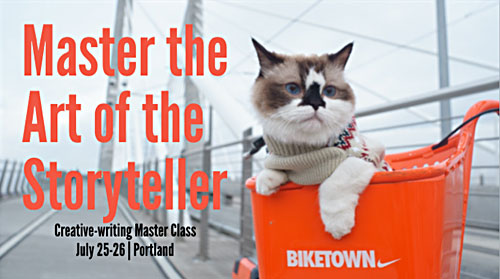Write better, easier & faster with this 5-step system
Have you ever come up with a brilliant idea — on the way home from the brainstorming meeting? Developed a creative theme for the annual report while pulling weeds? Written the perfect headline in the shower?

Welcome to the wonderful world of the creative process, where working sometimes doesn’t look like working, and where sticking with it is often the worst thing you can do to move ahead.
I’ve used the five-step creative process to come up with fresher, faster, more inspired ideas every day since I learned it at Hallmark Cards a million years ago.
But I’ve recently learned via Brain Pickings that it was the creation of a pre-Mad Men-era ad executive named James Webb Young, who put it down in a book called A Technique for Producing Ideas.
5-step creative process
To make the most of every writing minute in your day, use a process that works with — not against — your brain. Perform these steps in this order:
1. Forage, or gather information.
This is the “feed your brain” step of the process. Here’s where you conduct background research and interview sources — or hit the mall, museum and movies — for the raw material that will become your idea or story.
Avoid “creative incest.” “As with actual incest, the product of creative incest just keeps getting dumber and dumber and dumber with each generation.”
— Dan Kennedy, author of “No B.S.” marketing books
The key thing here is: Get out of your own backyard. The afield you seek inspiration, the bigger your ideas will be.
Beware the “but-that’s-not-like-our-project/company/style/industry/specialty” reflex. If you’re only willing to steal ideas from communications that are just like yours — say, the websites of Iowa insurance companies that specialize in agricultural coverage — your ideas will be as limited as your foraging.
Marketing guru Dan Kennedy calls that approach “creative incest.” “As with actual incest,” he says, “the product of creative incest just keeps getting dumber and dumber and dumber with each generation.”
2. Analyze that information.
Now that you have your raw materials, focus, sift through and organize them to see how the pieces fit together. Look for themes, holes, relationships and structure.
You might call this outlining, writing a walk-away sentence or developing a theme. That’s part of this process, sure. But the real goal is to upload the information to your brain so it can take over while you’re doing something more interesting.
3. Incubate.
Let the information simmer. This is where you take your eye off the ball and let the back of your mind work on your project for a while. As Agatha Christie used to say, “The best time to write is when you’re doing the dishes.”
Don’t have time to do the dishes while a deadline is looming? Instead of taking a break, move on to a new project. Forage and analyze project A, for example, then forage and analyze project B. While you work on project B, you’re incubating project A.
Stuck? Don’t plow through. The best approach may well be to move on.
4. Break through.
This is the magical moment where your brain presents a brilliant idea fully formed. This is where you come up with answers to questions like “What should I use for my lead?” and “How am I going to organize this thing?”
The French call it “l’esprit de l’escalier” — the wit of the staircase. That’s when you think of a great idea on your way out of the brainstorming meeting or come up with a snappy retort the day after someone makes a snarky remark.
5. Knuckle down.
Take Ernest Hemingway’s advice and “apply the seat of your pants to the seat of the chair.” In other words, turn your great idea into a great story.
Structure creativity.
Many obstacles to good writing actually stem from a bad writing process:
- Suffering from writer’s block? You might not be incubating enough. Trying to force yourself to write before you’re ready is a common cause of blank-page syndrome.
- Dealing with procrastination? You’re probably incubating for too long or at the wrong time — before you forage and analyze, maybe.
- Having trouble coming up with fresh story ideas? You may need to spend more time foraging or forage more widely.
It’s the process, people: Use these steps in this order, and you’ll find that you’re able to come up with more — and more useful — ideas.
“You can’t wait for inspiration. You have to go after it with a club.”
— Jack London, author, oyster pirate, deep-sea sailor, hobo and Alaskan prospector
Want to come up with fresher, faster, more inspired story ideas and writing insights? Learn how at our Master the Art of the Storyteller Master Class on July 25-26 in Portland. You’ll master a 5-step creative process that helps you produce more and better ideas.
Save $100 with our group discounts.
|
Sources: “A 5-Step Technique for Producing Ideas circa 1939,” Brain Pickings, May 4, 2012
James Webb Young, A Technique for Producing Ideas (public library), 1939
